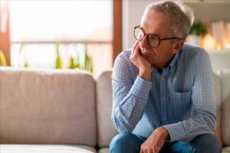Nye publikasjoner
Ensomhet reduserer antall friske år hos eldre voksne
Sist anmeldt: 02.07.2025

Alt iLive-innhold blir gjennomgått med medisin eller faktisk kontrollert for å sikre så mye faktuell nøyaktighet som mulig.
Vi har strenge retningslinjer for innkjøp og kun kobling til anerkjente medieområder, akademiske forskningsinstitusjoner og, når det er mulig, medisinsk peer-evaluerte studier. Merk at tallene i parenteser ([1], [2], etc.) er klikkbare koblinger til disse studiene.
Hvis du føler at noe av innholdet vårt er unøyaktig, utdatert eller ellers tvilsomt, velg det og trykk Ctrl + Enter.

En fersk studie publisert i tidsskriftet BMC Public Health bestemmer effekten av ensomhet på forventet levealder og identifiserer måter å forbedre subjektiv velvære og helse blant eldre mennesker.
Ensomhet er en følelse av frakobling og misnøye i forhold. Ensomhet har blitt identifisert som en betydelig og godt studert prediktor for psykisk og fysisk sykdom.
Ensomhet kan aktivere autonome nerveresponser, noe som forårsaker kronisk stress. Ensomhet kan også forverre aldersrelaterte sykdommer og øke risikoen for hjerte- og karsykdommer, funksjonshemming, demens og skrøpelighet. Ensomhet kan påvirke menn og kvinner ulikt; ensomme eldre kvinner har større sannsynlighet for å lide av depresjon og tap av fysisk funksjon.
Etter hvert som urbaniseringen øker i Kina, har tradisjonelle familiebånd og tilgjengeligheten av familiestøtte blitt svekket. Eldre voksne i Kina har større risiko for ensomhet; det er anslått at opptil 25 % av dem opplever ensomhet.
Denne studien brukte data fra China Longitudinal Study of Healthy Ageing, som inkluderte 15 500 personer i alderen 65 til 99 år. Deltakerne ble spurt om sine daglige aktiviteter (ADL) og selvvurdert helse (SRH) som mål på helse og velvære.
I stedet for å vurdere forekomsten av spesifikke sykdommer, ble deltakernes helse vurdert ved hjelp av ADL og SRH. Bruk av HLE i stedet for sykdomsprevalensmål unngikk også overlevelsesskjevhet.
Målet med denne studien var å identifisere sammenhenger mellom ensomhet og forventet levealder i hver aldersgruppe, HLE og den forventede sunne andelen av forventet levealder.
Gjennomsnittsalderen for deltakerne var 72,9 år. Eldre kvinner hadde større sannsynlighet for å være uutdannet, ha lavere inntekt, ha mistet ektefellen sin og bo alene.
Ensomhet var også mer vanlig blant kvinner (29,5 %) sammenlignet med menn (20,2 %). Imidlertid var omtrent 96 % av både menn og kvinner fysisk aktive, hvorav 82,5 % av mennene og 85,3 % av kvinnene anså seg selv som sunne.
Ett år etter at studien startet, var det mer sannsynlig at ensomme eldre voksne forble syke enn de som ikke opplevde ensomhet. Ensomme eldre voksne hadde også større sannsynlighet for å dø i denne perioden, uavhengig av deres grunnleggende helsetilstand.
Ensomme personer hadde lavere ADL- og SRH-skårer. Forventet levealder ved 65 år for ensomme personer var 20 år sammenlignet med 23 år for ikke-ensomme personer.
Studien fant at ensomhet har en betydelig innvirkning på forventet levealder hos eldre voksne, spesielt kvinner. Disse funnene understreker behovet for målrettede helsefremmende programmer for å redusere de negative effektene av ensomhet, spesielt blant eldre kvinner.
Konklusjoner
- Ensomhet er forbundet med dårlig fysisk og psykisk helse.
- Eldre kvinner er mer utsatt for effektene av ensomhet.
- Ensomhet kan føre til redusert ADL og SRH, noe som i siste instans påvirker forventet levealder og livskvalitet.
- Målrettede tiltak er nødvendige for å forbedre velvære og helse blant eldre, spesielt kvinner.
